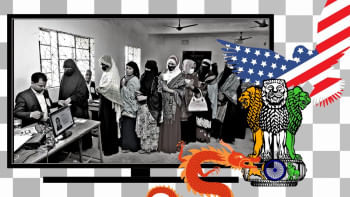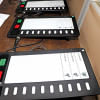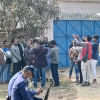Without support from bureaucracy, EC can’t hold fair elections

The phenomenon of high-ranking bureaucrats joining political parties after retirement is a matter of concern for many citizens. This is because it raises questions about their true loyalty and the integrity of the bureaucracy. When individuals are appointed to serve in government positions, they take an oath to serve the people and uphold the law. However, if they join a political party immediately after retirement, it sends a message that their loyalty may have been divided all along, and that, while serving in the bureaucracy, they may have worked in favour of a certain section of people in power or from within the power structure. And not only that, their subordinates may have also done the same.
To better understand the phenomenon, let us look at the Gaibandha-5 by-election.
The events surrounding the Gaibandha-5 by-election have raised concerns about the integrity of the country's institutions – particularly the Election Commission (EC). The Chief Election Commissioner expressed his frustration with the widespread irregularities that occurred during the by-election, stating that "elections [were] now out of control." The EC suspended the election and announced that it would take legal action against 134 public officials, including a returning officer, one additional deputy commissioner, one executive magistrate, 126 presiding officers, and five sub-inspectors for their involvement in the irregularities.
The reason behind taking such an action is simple: these officials did not act as they were supposed to under oath.
During an election, the civil administration, including the bureaucracy and police, are mandated by law to serve under the direct control of the EC. The EC relies on their integrity to successfully hold a free and fair election. However, during the Gaibandha-5 by-election, the opposite occurred. Officials acted as if they were not under oath and did not provide their allegiance to the Commission, resulting in widespread irregularities.
The fact that public officials acted against their oath raises concerns about who they were serving; the people they were supposed to serve under oath, or the party they are associated with? The aftermath of the by-election sends a negative message to the people, creating doubts about the integrity of these officials and the institutions they serve.
The erosion of institutional integrity is a significant issue. It is leading to a loss of faith in the democratic process of the country. When we lose confidence in the integrity of institutions, we become disillusioned with the democratic process
It is not surprising that the EC has not yet taken visible actions against the public officials. The EC is reliant on the civil administration's cooperation, and without it, the Commission cannot act. Unfortunately, this situation is not unique to Bangladesh, and it is not uncommon for public officials to act against their oath, especially when there is political pressure.
The erosion of institutional integrity is a significant issue. It is leading to a loss of faith in the democratic process of the country. When we lose confidence in the integrity of institutions, we become disillusioned with the democratic process. The second round of the Gaibandha-5 constituency election, held on January 3 with only 35 percent voter turnout, and the EC's shift from "out of control" to "fair, disciplined and peaceful manner", proved that people's participation no longer matters. The ruling party candidate won the by-election.
There was a time when nothing could stop people from exercising their voting rights. Blaming the cold for the lower turnout is perhaps nothing but covering up the weaknesses of the constitutional institutions.
All citizens have a responsibility to vote. Even if the outcome seems predetermined, it is essential to exercise the right to vote and make one's voice heard. It is only by participating in the democratic process that citizens can ensure that their elected officials are held accountable and that institutions remain independent and free from political pressure.
The EC is a constitutional body in Bangladesh. Our constitution has awarded the EC with absolute power to control and direct the civil administration during elections. But this is rendered meaningless if the civil administration does not cooperate with the EC, but ends up doing the opposite.
The events surrounding a few recent parliamentary by-elections and local government elections serve as a warning about the erosion of our institutional integrity. What happened after the local government elections was even worse – several elected representatives, including a freedom fighter, were sacked from their positions on questionable grounds.
Their termination was imminent as they had gone against the candidates nominated by their party, won the election, and faced non-cooperation from the civil administration at the local level. Compared to others, the freedom fighter was fortunate enough to get his position back – thanks to a court ruling declaring his termination illegal.
So, can the EC hold a free and fair national election? Under the prevailing conditions, it is nearly impossible. Why? With only nine months left before the national election, the law ministry is still sitting on the EC's proposal to amend the Representation of the People Order, 1972, the regulating law of the national election. It is mentioned under Article 126 of the constitution that it shall be the duty of all executive authorities to assist the EC in the discharging of its functions.
Can the EC do anything if the executive authorities feel that these are just words written on a piece of paper? It cannot.
These precedents will continue to have serious implications for the integrity of the bureaucracy and the legitimacy of the government's actions. Bureaucracy, civil administration, and law enforcement agencies need to remain impartial and serve the public interest, rather than aligning themselves with political parties.
Much of Bangladesh's recent economic slump is due to public funds being used to benefit mid- and high-ranking executive officials, further exacerbating inequality. But it has worked well in terms of winning their loyalty and confidence for the ruling party, with overall negative consequences for the people and the economy.
Meer Ahsan Habib is a Hubert Humphrey Fellow at Arizona State University. His Twitter handle is @meeriyadh

 For all latest news, follow The Daily Star's Google News channel.
For all latest news, follow The Daily Star's Google News channel. 










Comments